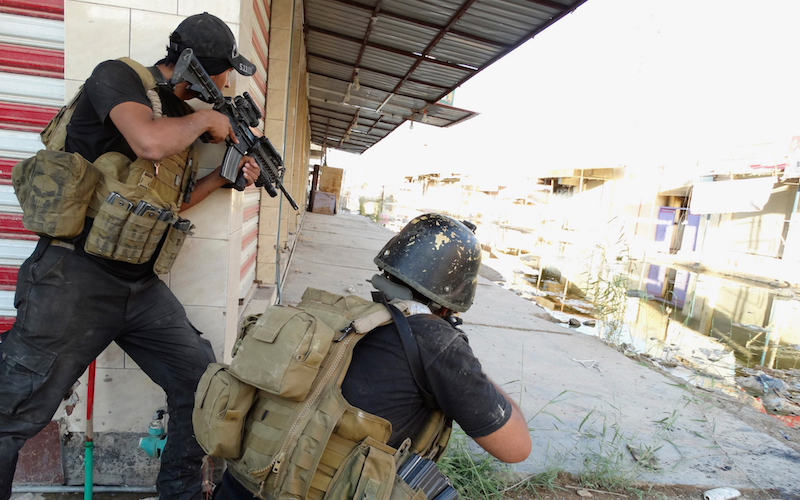
Iraq’s Instability Can Only be Solved by its Neighbors
As Iraq unravels and the closer ISIS forces approach Baghdad, the White House is growing increasingly alarmed and frustrated. President Obama summoned his security advisers on June 19 to deal with the deteriorating situation in Iraq. What he came up with became clear as he was taking questions from journalists gathered in the White House Press Room. “We do not have the ability to simply solve this problem by sending in tens of thousands of troops and committing the kinds of blood and treasure that has already been expended in Iraq.” Obama’s response was remarkably candid and direct, “Ultimately, this is something that is going to have to be solved by the Iraqis.”
It is now painfully evident that only Iraqis can save their nation from being torn into pieces, period. However, Iraq requires assistance. Its current government cannot face ISIS alone and expect to be successful. The Americans are not interested in another ground war in Iraq, and can most likely be counted on for intelligence and air support alone. It is time that Iraq’s neighbors come to its aid.
Intertwined Dilemmas
The crisis in Iraq is spiraling in directions that will affect every nation in the region. Once a fire of this nature is set, no one can predict where the winds of violence will cause it to spread. Sunni-led monarchies like Saudi Arabia, Qatar and Kuwait are not comfortable with the Shiite dominion over Baghdad; for them it is tantamount to conceding to the expansion of Shiism and thereby increased Iranian power and influence. This is one reason why they remain silent while the Islamic State of Iraq and Syria, also known as ISIS or ISIL, rampage through Iraq with terror and violence. Worse, there is evidence they have ignored and denied alleged financing of ISIS by their own citizens and secret governmental channels sympathetic to the Sunni rebels and terrorists in Iraq.
Iran and Syria, on the other hand, see the ISIS insurgency threatening their interests. Iran will not remain passive and non-supportive while ISIS overthrows its allied al-Maliki government.
The group is comprised of extremist Sunni militias and ex-members of the former dictator Saddam Hussein’s Baathist Party. In Syria, a de facto axis has developed since the onslaught of the Syrian civil war broke out in 2011: the pro-Iranian-Russian Assad regime, so-called moderate Sunni militias, and the pan-Arabic caliphate-dreaming ISIS movement of Iraq-Syria.
Turkey faces another dilemma. The more land ISIS takes and occupies in Iraq, the weaker the central government in Baghdad becomes. Because of al-Maliki’s weakened position in Baghdad, Iraqi Kurds may establish an independent Kurdistan, which would alarm Turkey. In the past, Ankara has not refrained from launching airstrikes to thwart Iraq-based Kurdish activities that it views as threatening. Turkish precedent and well-stated national interests should prove to inhibit the more extreme Kurds in Iraq from forming their own nation.
ISIS: A Common Foe?
Defeating ISIS will be complicated. The solution must be well thought out, planned and executed. Most importantly, the response should be regional and include other Islamic states. Why should other Islamic nations help? In the Syrian city of Raqqa, where ISIS headquarters are located, there is an ISIS flag depicting its enemies stretching from Syria to Saudi Arabia. Oddly, Israel is not included.
ISIS, though an offshoot of Al Qaeda, has become so terroristic and brutal that it has been ejected from Al Qaeda’s accepted branches. ISIS demolished shrines, ruthlessly exterminated hundreds of Iraqi soldiers in a brazen display of cruelty and criminality. The evident purpose for the massacre was to frighten Iraqi armed forces, demoralize the civilian population, and to spread panic and terror. What it also did is to make clear that a new dark age would descend upon the Middle East like a plague. “We are facing the risk of a terrorist-sponsored state,” warns Richard Grenell, a former Bush administration aide and diplomat.
The bottom line is that ISIS is a threat to the region and to other Islamic states – Sunni and Shiite alike. ISIS militias are determined to gain political and military control of Baghdad and Damascus. It has vowed to establish an Islamic caliphate for the 21st century. If it succeeds, one can only imagine the expansionist goals it will seek to realize, and those goals will be a threat to every Middle Eastern nation, to all of Islam, and to Western interests in the region.
“Not a war between Shiites and Sunnis”
As soon as U.S. military forces departed Iraq, Prime Minister Nouri al-Maliki started to clamp down on and exclude Sunni politicians from any power sharing agreement. Much to his chagrin, his actions backfired and led to the formation of militant groups like ISIS. Although sectarian division is common in Iraq, the war that ISIS has waged on Maliki’s government cannot be labeled only a sectarian one. ISIS is comprised of Iraq Sunnis who are desperate to regain political, military and economic control of Iraq and its resources. ISIS also seeks revenge on the Shiites who they believe have usurped their traditional role of leadership over the country. ISIS, however, does not represent Iraqi Sunnis.
“What is happening in Iraq is not a war between Shiites and Sunnis,” said Iranian supreme leader Ayatollah Khamenei. His statement is both strategic and insightful. Khamenei hopes to downplay the competition and hatred between the sectarian divisions in Iraq, and instead push towards a workable compromise that will ensure the integrity of Iraq geographically, make possible a new government, and replace the inflexible Maliki with a more acceptable and inclusive leader who will appeal to both Sunnis and Shiites. Iran’s influence is greater over a unified Iraq than over a divided and broken Iraq.
Eyes of the World are upon Iraq and Islamic Leadership
It will not be easy to destroy ISIS and to put Iraq on the right track. American policy has been a failure from the start. Developments that are beyond Maliki and U.S. control have made it impossible to experiment with solutions for Iraq. Maliki has failed; ISIS is a major threat; and a power vacuum will prove to be a disaster. A cautious and united effort is a must at this crucial juncture. The Organization of Islamic Conference, OIC, could play a significant role. Though it has been toothless since its inception in 1967, the 57-member organization has the potential to prove its worth. It can meet, pledge financial support, offer military assistance, and establish basic principles for its member nations.
OIC is the only institution that can bring together all Islamic-majority countries under the same roof. It can convene an extraordinary emergency hearing on Iraq. The ultimate goal of such a conference would be to have Riyadh-leaning Sunni nations and Tehran-leaning Shiite nations hold direct talks leading to the defeat of ISIS, replacement of Nouri al-Maliki as the Iraqi premier, and the establishment of basic expectations for Islamic nations.
Despite their stated intentions and lofty speeches, leaders from the OIC have yet to talk with each other or to work toward solutions beneficial for all. An agreement between Saudi Arabia and Iran, or a sincere willingness to cooperate, must be reached soon. It is only natural that the two key players in the Middle East hold direct talk with each other, if for no other reason, then for national survival.
The Gulf States, Iran and Turkey, can lead a process to replace Maliki with a flexible, inclusive and moderate Iraqi leader. The United States can continue to offer quiet advice and solid military and intelligence support. The OIC must form and deploy a joint task force composed of Sunni and Shiite’s that will guarantee and protect a buffer zone between Shiite controlled Baghdad and ISIS-captured territory. OIC-member states like Bangladesh and Pakistan are the leaders in maintaining UN peace missions, and they should be consulted about providing forces for such a role. Further, OIC must demand that those who are supporting ISIS must stop.
Provided the deployment of an OIC joint task force helps end the violence of the Iraqi civil war, then the next step must be to help Iraq form a new government that is far more representative and inclusive of all Iraq’s minorities and majorities. Inclusion is the only way forward. If examples set by Paul Bremer and Nouri al-Maliki do not demonstrate this simple fact, then nothing does. If the OIC and Islamic nations fail at this critical juncture, then the future for regional and institutional cooperation looks bleak. The winds of change have blown up in the mighty Arabic deserts, and the question we must ask ourselves is, who shall win, the good or the bad? It is up to the Sunnis and Shiites of Iraq. The eyes of the world are now upon Iraq.

